

Author Interview: Lance Dodes, Author Of 'The Sober Truth' Since its founding in the 1930s, Alcoholics Anonymous has become part of the fabric of American society.
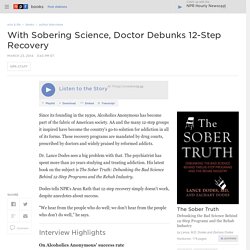
AA and the many 12-step groups it inspired have become the country's go-to solution for addiction in all of its forms. These recovery programs are mandated by drug courts, prescribed by doctors and widely praised by reformed addicts. Dr. Lance Dodes sees a big problem with that. The psychiatrist has spent more than 20 years studying and treating addiction. Dodes tells NPR's Arun Rath that 12-step recovery simply doesn't work, despite anecdotes about success. "We hear from the people who do well; we don't hear from the people who don't do well," he says. Interview Highlights On Alcoholics Anonymous' success rate There is a large body of evidence now looking at AA success rate, and the success rate of AA is between 5 and 10 percent. It's not only that AA has a 5 to 10 percent success rate; if it was successful and was neutral the rest of the time, we'd say OK.
Alcoholics Anonymous, Without the Religion. Photo Three floors above a Manhattan street of loading docks and coffee shops, in a functional room of folding chairs and linoleum tile, a man who introduced himself as Vic began to speak.
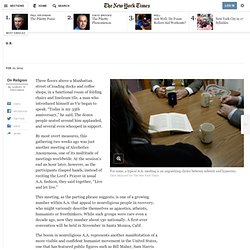
“Today is my 35th anniversary,” he said. The dozen people seated around him applauded, and several even whooped in support. By most overt measures, this gathering two weeks ago was just another meeting of Alcoholics Anonymous, one of its multitude of meetings worldwide. At the session’s end an hour later, however, as the participants clasped hands, instead of reciting the Lord’s Prayer in usual A.A. fashion, they said together, “Live and let live.” This meeting, as the parting phrase suggests, is one of a growing number within A.A. that appeal to nonreligious people in recovery, who might variously describe themselves as agnostics, atheists, humanists or freethinkers. The pseudo-science of Alcoholics Anonymous: There’s a better way to treat addiction. Alcoholics Anonymous is a part of our nation’s fabric.
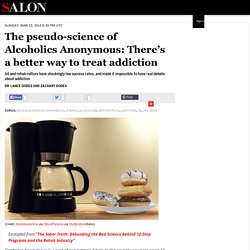
In the seventy-six years since AA was created, 12-step programs have expanded to include over three hundred different organizations, focusing on such diverse issues as smoking, shoplifting, social phobia, debt, recovery from incest, even vulgarity. All told, more than five million people recite the Serenity Prayer at meetings across the United States every year. Twelve-step programs hold a privileged place in our culture as well. The legions of “anonymous” members who comprise these groups are helped in their proselytizing mission by TV shows such as “Intervention” (now canceled), which preaches the gospel of recovery. “Going to rehab” is likewise a common refrain in music and film, where it is almost always uncritically presented as the one true hope for beating addiction. Peer-reviewed studies peg the success rate of AA somewhere between 5 and 10 percent.
Does AA get an 'F' for treating alcoholics? When people look for help with alcohol dependency, they're often referred to Alcoholics Anonymous.
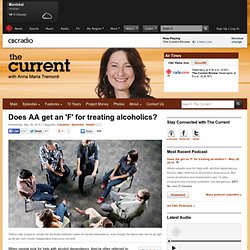
But some alcoholics and researchers say 12-step programs are not only outdated, but dangerous. Alcohol abuse is linked to more than three million deaths worldwide per year and is thought to cause an increased risk of developing more than 200 diseases. This month, the World Health Organization released a report on the high cost of drinking too much. It found that Canadians drink more than the global average. And 31 per cent of male drinkers engage in binge drinking, which is twice the global average. But not everyone thinks AA programs are the best resource to combat alcohol abuse. "There is a large body of evidence now looking at AA success rate. Dr. "It's not only that AA has a 5-10 per cent success rate...But it's harmful to the 90 per cent that don't do well.
If you have struggled with alcohol, or if someone in your family has, what kind of help has worked? Author Interview: Lance Dodes, Author Of 'The Sober Truth' Vancouver AA meetings for Agnostics and Atheists. Foreword There are many versions of the 12 Steps.
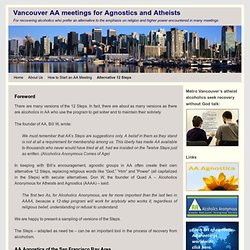
In fact, there are about as many versions as there are alcoholics in AA who use the program to get sober and to maintain their sobriety.